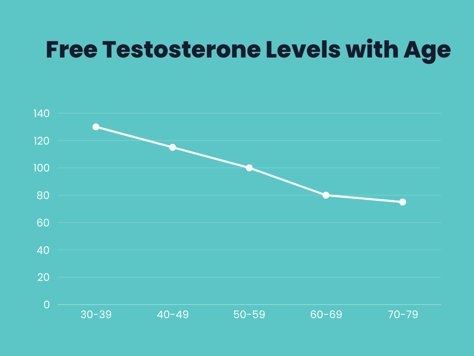Mens Health : Optimize Your
Hormone Health
Experience personalized hormone optimization through advanced medical science and comprehensive care.
Report significant improvement in energy and vitality within 6 weeks of treatment
Average increase in lean muscle mass during initial optimization phase
Improvement in bone density observed over 36-month study period
Understanding Hormone Health
Explore the science behind hormone optimization and its impact on your well-being.
Natural Hormone Decline
Decline in testosterone levels per decade after age 30
- Peak testosterone levels occur in early 20s
- Free testosterone declines faster than total levels
- Modern lifestyle factors accelerate decline
- Environmental influences impact hormone balance

Population Trends
Faster decline rate in modern populations compared to historical data
- Significant decline since 1970s
- Independent of age-related changes
- Affects all age groups
- Multiple environmental factors involved

Treatment Approaches
Explore our comprehensive range of hormone optimization methods, each tailored to individual needs and lifestyle requirements.
Injection Therapy
Precise dosing with consistent hormone levels through carefully timed administration.
- Weekly administration protocol
- Precise dosage control
- Optimal absorption rates
- Regular monitoring included
Pellet Therapy
Long-term hormone delivery system providing consistent levels over several months.
- 3-6 month duration
- Consistent hormone levels
- No daily maintenance
- Minimal intervention required
Topical Applications
Daily application methods offering flexibility and convenience in treatment.
- Daily application protocol
- Non-invasive method
- Flexible dosing options
- Easy to adjust levels
| Treatment Method | Administration | Duration | Key Benefits | Best Suited For |
|---|---|---|---|---|
| Injection Therapy | Weekly/Bi-weekly | 7-14 days | Precise control, consistent levels | Those seeking optimal control |
| Pellet Therapy | Every 4-6 months | 4-6 months | Long-lasting, minimal maintenance | Busy professionals, travelers |
| Topical Methods | Daily | 24 hours | Non-invasive, flexible | Those preferring daily control |
Clinical Outcomes
Comprehensive Assessment & Monitoring
Our thorough evaluation process ensures optimal treatment outcomes through precise measurement and continuous monitoring.
Initial Assessment
- Complete hormone panel analysis
- Comprehensive metabolic evaluation
- Cardiovascular health screening
- Body composition assessment
- Detailed medical history review
- Lifestyle factor analysis
Key Markers Evaluated
- Total and Free Testosterone
- Estradiol and DHT
- Thyroid Function (TSH, T3, T4)
- Cortisol Levels
- Growth Factors
- Inflammatory Markers
Hormone Panel
Comprehensive analysis of all relevant hormone levels and their interactions.
Metabolic Health
Evaluation of metabolic function, including glucose regulation and lipid profile.
System Function
Assessment of cardiovascular, thyroid, and other key system functions.
Comprehensive baseline assessment and treatment initiation
First follow-up with adjustment of treatment parameters
Detailed progress evaluation and protocol refinement
Regular monitoring and optimization as needed
Safety Monitoring & Considerations
Regular Monitoring
- Blood pressure checks
- Hematocrit levels
- PSA monitoring
- Liver function tests
Warning Signs
- Unusual swelling or pain
- Significant mood changes
- Sleep disturbances
- Cardiovascular symptoms

The Importance of Comprehensive Hormone Assessment
Understanding the intricate balance of hormones in the body is critical for maintaining optimal health. A comprehensive hormone assessment goes beyond just measuring testosterone levels; it evaluates a wide range of hormones that play interrelated roles in the body. This holistic approach is essential because hormones often work in synergy, affecting various physiological processes.
Why Check Other Hormones?
1. Complementary Effects: Hormones like estrogen, progesterone, and cortisol interact with testosterone, influencing its effectiveness and balance. For instance, elevated cortisol levels due to stress can suppress testosterone, leading to imbalances that impact energy, mood, and overall health.
2. Thyroid Function: The thyroid gland produces hormones that regulate metabolism, energy levels, and mood. Assessing thyroid function alongside testosterone levels can provide a more complete picture of an individual's hormonal health.
3. Insulin and Glucose Metabolism: Insulin is crucial for regulating blood sugar levels and energy balance. Hormone imbalances can affect insulin sensitivity, increasing the risk of conditions like diabetes and metabolic syndrome. Understanding this relationship can help tailor more effective treatment plans.
4. Adrenal Health: The adrenal glands produce hormones that help the body respond to stress and regulate metabolism. Assessing adrenal function can identify imbalances that may be contributing to fatigue, mood changes, and other symptoms.
5. Growth Hormone and IGF-1: These hormones play roles in muscle growth, bone density, and overall vitality. Evaluating their levels can help in understanding issues related to aging, muscle strength, and recovery.
By conducting a comprehensive hormone assessment, individuals can gain insights into the complex interactions between different hormones and how they affect overall health. This thorough evaluation allows for personalized interventions that address specific needs, ultimately enhancing quality of life and promoting longevity.

Contraindications for Testosterone replacement
While hormone replacement therapy (HRT) offers numerous benefits, it is crucial to be aware of potential contraindications and exercise caution. Not everyone is an ideal candidate for testosterone replacement or other hormone therapies, and careful consideration must be given to individual health conditions and risk factors.
Contraindications for Testosterone Replacement
1. Prostate Cancer or Elevated PSA Levels: Men with a history of prostate cancer or unexplained elevated prostate-specific antigen (PSA) levels are generally advised against testosterone replacement. Testosterone can potentially stimulate the growth of prostate cancer cells.
2. Breast Cancer: Although rare in men, the presence of breast cancer can be a contraindication for testosterone therapy due to potential hormonal influence on tumor growth.
3. Severe Sleep Apnea: Testosterone replacement can exacerbate sleep apnea symptoms. Individuals with untreated or severe sleep apnea should seek medical advice before starting therapy.
4. Uncontrolled Heart Conditions: Those with uncontrolled heart conditions or a recent history of cardiovascular events should approach testosterone therapy with caution. Hormone replacement may affect heart health and should be closely monitored by a healthcare professional.
5. Polycythemia: Testosterone therapy can increase red blood cell count, leading to polycythemia, which increases the risk of blood clots. Monitoring blood parameters is essential during treatment.
Signs of Excessive Replacement
While hormone replacement can have positive effects, excessive treatment may lead to adverse outcomes. It's important to recognize the signs of over-replacement:
Increased Aggression and Mood Swings
Acne and Oily Skin
Gynecomastia
Enlarged Prostate
Monitoring hormone levels and symptoms regularly with the guidance of a healthcare professional is essential to ensure safe and effective hormone replacement therapy. Tailored treatment plans and ongoing assessments can help mitigate risks and enhance the benefits of HRT.
Research Evidence & Clinical Studies
Comprehensive analysis of peer-reviewed research supporting our treatment approaches.
Physical Improvements
- Significant strength improvements
- Enhanced body composition
- Improved bone density
- Better metabolic function
Quality of Life
- Enhanced cognitive function
- Improved mood stability
- Better sleep quality
- Increased vitality
Scientific References
1. Nasser M, et al. (2021). Testosterone: From Basic Research to Clinical Applications. Pharmacological Reviews, 73(3), 1050-1099.
https://doi.org/10.1124/pharmrev.120.0002342. Wang C, et al. (2016). Efficacy and Safety of the 2% Formulation of Testosterone Topical Solution. Journal of Clinical Endocrinology & Metabolism, 101(3), 1096-1106.
https://doi.org/10.1210/jc.2015-39193. Snyder PJ, et al. (2018). Effects of Testosterone Treatment in Older Men. New England Journal of Medicine, 378(1), 25-35.
https://doi.org/10.1056/NEJMoa15061194. Snyder PJ, et al. (2017). Effect of Testosterone Treatment on Volumetric Bone Density and Strength. JAMA Internal Medicine, 177(4), 471-479.
https://doi.org/10.1001/jamainternmed.2016.95395. Chodick, G., Epstein, S., & Shalev, V. (2020). Secular trends in testosterone - findings from a large state-mandate care provider. Reproductive Biology and Endocrinology: RB&E.
https://doi.org/10.1186/s12958-020-00575-26. Mazur, A., Westerman, R., & Mueller, U. (2013). Is Rising Obesity Causing a Secular (Age-Independent) Decline in Testosterone among American Men? PLoS ONE, 8.
https://doi.org/10.1371/journal.pone.00761787. Gray, A., Feldman, H., McKinlay, J., & Longcope, C. (1991). Age, disease, and changing sex hormone levels in middle-aged men: results of the Massachusetts Male Aging Study. The Journal of Clinical Endocrinology & Metabolism, 73(5), 1016-1025.
https://doi.org/10.1210/JCEM-73-5-10168. Feldman, H., Longcope, C., Derby, C., Johannes, C., Araujo, A., Coviello, A., Bremner, W., & McKinlay, J. (2002). Age trends in the level of serum testosterone and other hormones in middle-aged men: longitudinal results from the Massachusetts male aging study. The Journal of Clinical Endocrinology & Metabolism, 87(2), 589-598.
https://doi.org/10.1210/JCEM.87.2.82019. Corona G, et al. (2020). Testosterone Replacement Therapy: The Emperor's New Clothes. Reviews in Endocrine and Metabolic Disorders, 21(4), 417-448.
https://doi.org/10.1007/s11154-020-09569-210. Huang G, et al. (2016). Testosterone and the Brain: A Meta-Analysis of Clinical Trials. American Journal of Men's Health, 10(6), 470-479.
https://doi.org/10.1177/155798831559706311. Travison TG, et al. (2007). A population-level decline in serum testosterone levels in American men. Journal of Clinical Endocrinology & Metabolism, 92(1):196-202.
https://doi.org/10.1210/jc.2006-1375Begin Your Optimization Journey
Embarking on a comprehensive hormone assessment can be a pivotal step toward better health and well-being. At Blue Coast Longevity, we offer detailed hormone evaluations that are tailored to each individual's needs.
We recognize the demands of modern life and offer the convenience of virtual consultations, allowing you to receive expert advice and care from the comfort of your home. Our approach also includes comprehensive cardiometabolic health assessments, ensuring that every aspect of your health is considered.
Take the first step towards revitalizing your health and unlocking the benefits of hormone balance. Schedule your comprehensive hormone health assessment with us today, and let us help you achieve the vibrant, healthy life you deserve. Visit Blue Coast Longevity to learn more and start your journey to optimal health and longevity.


